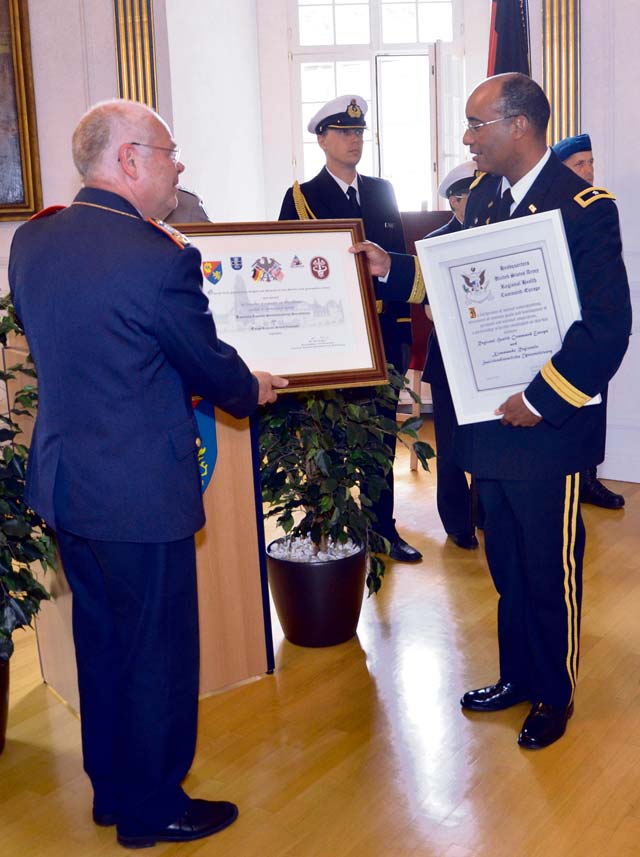Commanders from the U.S. Army Europe Regional Medical Command and the German military Regional Medical Care Command formalized a partnership agreement during a ceremony in Diez, Germany June 16 to increase opportunities for collaboration and mutually beneficial exchanges.
Brig. Gen. Van Coots, ERMC Commanding General, exchanged partnership certificates with Bundeswehr Kommando Regionale Sanitätsdienstliche Unterstützung Commanding General Maj. Gen. (Dr.) Dirk Raphael at Schloss Oranien-stein, headquarters for the German command. The ceremony formalized discussions between the two organizations that have been ongoing for several months.
The RMCCOM, as the German unit is known, is responsible for the treatment and medical examination of German Soldiers in 128 medical clinics throughout the country. ERMC provides medical care for more than 200,000 Soldiers, family members, civilian employees and retirees through their 13 health clinics – nine in Germany – and Landstuhl Regional Medical Center.

Photo by Ed Drohan, Europe Regional Medical Command Public Affairs
Maj. Gen. (Dr.) Dirk Raphael, left, commander of the Bundeswehr Regional Medical Care Command at Diez, Germany, exchanges partnership certificates with Brig. Gen. Van Coots, commanding general of U.S. Army Europe Regional Medical Command, during a ceremony at Schloss Oranienstein June 16.
“This ceremonial act will officially mark a new beginning in the bilateral cooperation between ERMC and RMCCOM,” Raphael said. “The partnership between ERMC and RMCCOM is an excellent extension to the well-tried and reliable ’shoulder-to-shoulder’ cooperation during our joint deployments in Afghanistan and Kosovo for more than 15 years.”
For Coots, the partnership is a natural extension of the cooperation between the two nations in the past.
“Good partnerships have certain characteristics – trust, mutual respect, good communication, and common values,” Coots explained. “These characteristics exist among us here today, and these characteristics are why I believe we will be successful.
“Our military medical assets today are commonly asked to handle more missions with less resources and/or personnel. Increasingly, this is blurring the lines between operational medical units and garrison healthcare facilities,” Coots said. “This makes the partnership between our forces even more important to enabling NATO and ensuring we have the capabilities and the capacity to respond as allies when needed.”
Initial partnership activities should include short term staff exchanges and interaction between the two units during social events, Raphael said. Planning is ongoing for more extensive exchanges, possibly including medical personnel, once some hurdles such as credentialing procedures can be cleared.
“Considering this new field of military tasks, we want to start a close and reliable cooperation in order to actually live and feel the partnership between ERMC and RCCOM,” Raphael said.
The partnership is extremely important in light of current events happening throughout the region.
“We are all aware of the security challenges facing the European region,” Coots said. “These challenges require strength among allies. Partnerships like the one we are here to recognize today create beneficial opportunities, improve interoperability and capacity among partners and allies, and contribute to a strong Europe. As we take advantage of opportunities to enhance open cooperation among our medical services, we ensure that we are prepared to respond to the challenges of today
and tomorrow.”


